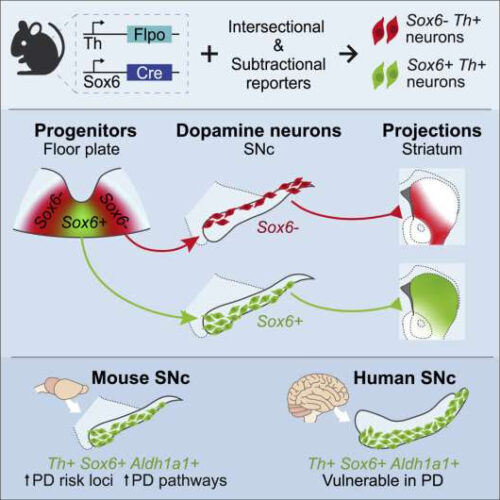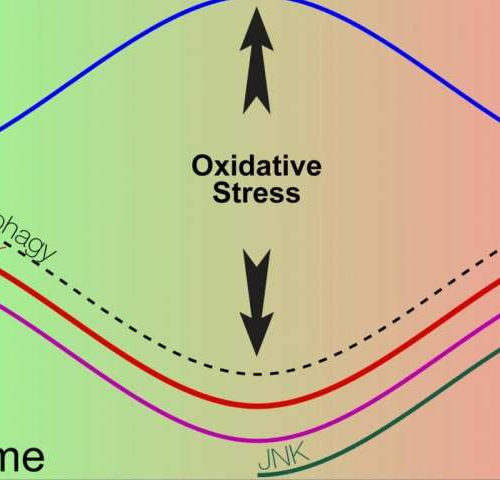by Louisiana State University The regions affected by ELV-N34 are in close contact with the FAD pocket and the interface zone. The alignment of the peptides with the secondary structure of the TXNRD1 (Fig. S6 and Tables S6–S9) fell into two groups displayed as group A (yellow) and group B (green). The upper left quadrant shows...
Tag: <span>degenerative diseases</span>
Uncovering the degenerative basis of Parkinson’s disease
by Melissa Rohman, Northwestern University Graphical abstract. Credit: DOI: 10.1016/j.celrep.2021.109975 Northwestern investigators have discovered the molecular signature of a subset of dopaminergic neurons with an increased vulnerability to degeneration. The findings shed light on the mechanisms at play within a small subsection of the brain’s substantia nigra, called the pars compacta, which contribute to the development...
Dysfunction in the mitochondrial respiration leads to cartilage degenerative diseases
UNIVERSITY OF COLOGNE A team led by Professor Dr. Bent Brachvogel, Head of Experimental Neonatology at the Faculty of Medicine and University Hospital Cologne, has discovered previously unknown regulatory mechanisms of tissue organization. Together with other researchers in Brachvogel’s team, first author of the new study and licensed pharmacist Kristina Bubb investigated changes in the...
Early, late stages of degenerative diseases are distinct, study shows
by Jade Boyd, Rice University Based on thousands of experiments over more than a decade, Rice University biochemists Michael Stern and James McNew believe degenerative diseases as varied as Alzheimer’s, Parkinson’s and muscle atrophy occur in two phases (green and red) marked by distinct alterations in the activity of the signaling pathway proteins TOR, AMPK, Foxo...
Simple blood test could one day diagnose motor neurone disease
by University of Sussex Scientists at the University of Sussex have identified a potential pattern within blood which signals the presence of motor neuron disease; a discovery which could significantly improve diagnosis. Currently, it can take up to a year for a patient to be diagnosed with amyotrophic lateral sclerosis(ALS), more commonly known as motor...
Studies of membrane vesicles pave the way to innovative treatments of degenerative diseases
A paper came out in Cells in December 2019 KAZAN FEDERAL UNIVERSITY Research team leader Marina Gomzikova, employee of the Gene and Cell Technologies Lab, started working on extracellular microvesicles (ECMVs) in 2013, when she was enrolled in her PhD course. Since then, very promising properties were found in ECMVs derived from human mesenchymal stem...
Scientists are inching closer towards new therapies for degenerative diseases
Human body is like a huge robot, which has its movement and electronics. We are partially mechanical and partially electronic, but the most mysterious part is how these two mediums connect together. Scientists from the University of Edinburgh and the University of Oxford found two molecules that are responsible for connecting nerves with muscles. These...
Can Supplements Improve Eye Health and Vision?
Posted Today You’ve probably heard someone say, “Eat your carrots, they’re good for your eyes.” You may have also seen advertisements for nutritional supplements for eye health. What minerals and vitamins benefit your eyes most? A few nutrients can help maintain eye function, protect against harmful light and reduce the development of age-related degenerative diseases of the eye. But more research is needed to...
Study of nervous system cells can help to understand degenerative diseases
The results of a new study show that many of the genes expressed by microglia differ between humans and mice, which are frequently used as animal models in research on Alzheimer’s disease and other neurodegenerative disorders. Microglia are the primary immune cells of the central nervous system, with functions similar to those of white blood...



